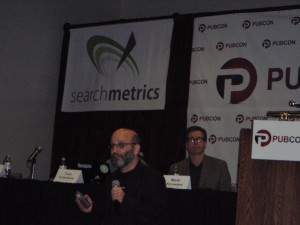As marketing departments jump on the "social media" bandwagon and start diverting large portions of their marketing budgets on them, many have no clue on how to effectively execute this effort, nor do they even have the fundamental understanding of how measure their success.
The first step marketing departments need to make is to stop calling it social media. Social media are the individual tools used to spread your marketing message through social interaction. For example placing a phone a call, holding a webinar, setting up a facebook page, establishing a Twitter account, creating social content (a blog), etc. When you add the different social media tools used in your campaign together you get a "social marketing campaign". Now that we got this settled, we can go on to establishing the basic criteria for any marketing campaign its purpose.
The primary purpose of any social marketing campaign ("social campaign") is to draw people together who have a common interest (your product). You can then engage & interact with them. Now for each organization you first need to identify and define your goals and objectives for this interaction. Typical ones include:
- brand awareness;
- increase in sales;
- improved customer relations;
- improved customer satisfaction
While there are hundreds of possible purposes, you need to pick one. Once the purpose is defined, you can then define the objectives and goals of the social campaign and implement tools to monitor your success towards them.
For example, if you goal is "improved customer relations" you can set an objective of reducing the amount of negative posts (tweets, blogs, etc.) or negative reviews with the goal of reducing these by 50% within 3 months.
With objectives and goals clearly defined, the best social media properties to meet the goals and objects can be identified. Creative material & an implementation strategy prepared along with the acquisition and implementation of tools and methods for monitoring the success of the campaign can be establish.
 Last point that all marketing departments need to remember is that social marketing isn't anything new. It's been around thousands of years. Yet more modern examples can be found by simply going back to the early to mid 1990s. Back then a popular Internet hangout (yes mostly geeks) were Usenet groups. Usenet groups to those unfamiliar with them can best described as a place where anyone could post a message and members of the group could post responses for all to see (they would eventually morph into discussion groups).
Last point that all marketing departments need to remember is that social marketing isn't anything new. It's been around thousands of years. Yet more modern examples can be found by simply going back to the early to mid 1990s. Back then a popular Internet hangout (yes mostly geeks) were Usenet groups. Usenet groups to those unfamiliar with them can best described as a place where anyone could post a message and members of the group could post responses for all to see (they would eventually morph into discussion groups).
Back in the 90s a food manufacture monitored a Usenet group on its brand. Within this Usenet group fans of the brand were quickly swapping posts about the various flavors and changes to packaging etc. Little did they know that there was a fly on the wall monitoring all their posts. This worked wonders as the company would test market new flavors and then seed the conversation with "has anyone seen the new XXX flavor is it any good??". Very quickly those in the test market were responding with their thoughts (too sweet, blah, yummy) which would then be harvested and processed by the brand in determining if adjustments were necessary to new the flavors before a national release or if they should be scrapped all together.
Is this use of a Usenet group any different then what a brand could use its facebook page for or perhaps a facebook page created by an existing fan? Not in the least!
Let's stop trying to reinvent the wheel under the buzz phrase "social media" and recognize our efforts as "social marketing campaigns" and that they've been around forever.





















